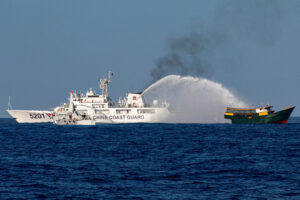Marcos boosts maritime security as tensions with China escalate

By Kyle Aristophere T. Atienza, Reporter
PHILIPPINE President Ferdinand R. Marcos, Jr. has ordered agencies to boost coordination on maritime security to confront “a range of serious challenges” to territorial integrity and peace, as a sea dispute with China worsens.
“Despite efforts to promote stability and security in our maritime domain, the Philippines continues to confront a range of serious challenges that threaten territorial integrity, but also the peaceful existence of Filipinos,” he said in Executive Order 57.
The order, which was released on Sunday, reorganized the 10-member National Coast Watch Council (NCWC) and renamed it to the National Maritime Council, which will still be headed by his executive secretary.
The order does not mention China but follows a series of confrontations and accusations between the two neighbors over disputed areas of the South China Sea.
China claims almost the entire South China Sea, through which more than $3 trillion of annual ship-borne commerce goes through. Its claims overlap with those of the Philippines, Vietnam, Indonesia, Malaysia and Brunei.
A United Nations-backed tribunal in 2016 voided China’s expansive claims for being illegal.
The latest flare-up occurred on March 23, when China used water cannon to disrupt a Philippine resupply mission to Second Thomas Shoal for soldiers guarding a warship intentionally grounded on a reef 25 years ago.
Last week, Mr. Marcos said his government would enforce countermeasures against “illegal, coercive, aggressive and dangerous attacks” by China’s coast guard and maritime militia within the Philippines’ exclusive economic zone in the waterway.
His order expands the government’s maritime council by adding the national security adviser, solicitor general, National Intelligence Coordinating Agency chief and the South China Sea task force as members.
The order appears to expand the role of the military by naming the Armed Forces of the Philippines, not just the navy, among the agencies supporting the council.
The renamed National Maritime Council will be the central body to formulate strategies to ensure a “unified, coordinated and effective” framework for the Philippines’ maritime security and domain awareness.
‘FREE FROM FEAR’Mr. Marcos increased the number of agencies supporting the council to 13 from nine, including the space agency and the University of the Philippines’ Institute for Maritime Affairs and the Law of the Sea.
The late President Benigno S.C. Aquino III created the old National Coast Watch Council through an executive order in 2011, a year before a standoff with China over the Scarborough Shoal.
Mr. Marcos noted that despite efforts to promote stability within the Philippines’ maritime domain, the country continues to confront “serious challenges” that threaten its territorial integrity and Filipinos’ “fundamental right to live in peace and freedom, free from fear of violence and threat.”
Under the March 25 order, the National Task Force for the West Philippine Sea will get policy guidance from the President through the new council.
It also renamed the NCWC secretariat to the Presidential Office for Maritime Concerns, which will provide consultative, research, administrative and technical services to the new council.
The secretariat “may report directly to the President on critical and urgent matters and issues affecting the country’s maritime security and domain awareness.”
The President ordered agencies including the military, police, the Justice department, Customs, Immigration and Investigation bureaus to help the new council.
Mr. Marcos last week said a “countermeasure package” would be enforced in the coming weeks “in the face of illegal, coercive, aggressive, and dangerous attacks” by China’s coast guard and maritime militia.
He said his government has been in “constant communication” with allies in the international community.
Mr. Marcos said that while his country does not seek conflict with any nation, it will “not be cowed into silence, submission or subservience.” “Filipinos do not yield.”
“There is a clear indication now that Manila will be accelerating the utility of agreements forged with like-minded traditional and nontraditional partners in the realm of defense and maritime security cooperation,” Don Mclain Gill, who teaches international relations at De La Salle University in Manila, said in a Facebook Messenger chat.
“Manila understands the multifaceted nature of Chinese belligerence and power projection in the West Philippine Sea,” he added, referring to areas of the South China Sea within the country’s exclusive economic zone.
Mr. Marcos will meet with US President Joseph R. Biden and Japanese Prime Minister Fumio Kishida at the White House on Apr. 11 for their first-ever three-way summit.
They are expected to advance a trilateral partnership built on historical ties, growing economic relations, shared democratic values and a “shared vision for a free and open Indo-Pacific,” according to the White House.
“The three-way summit will set a gold standard on how other like-minded democratic nations will forge distinct alliances and strategic partnerships in the Indo-Pacific region to test China’s belligerence and dangerous attacks,” said Chester B. Cabalza, founder of Manila-based International Development and Security Cooperation.
“If this norm succeeds, Beijing will be pacified to follow legal and nonaggressive actions and to seek diplomacy by all means,” he said via Messenger chat. — with Reuters

![Photo of [B-SIDE Podcast] PHL’s battle against fake news on West Philippine Sea](https://redstateinvestings.com/wp-content/uploads/2023/08/2023-08-22-B-side-KyleGill-ART-300x300-58td91-300x220.jpeg)


